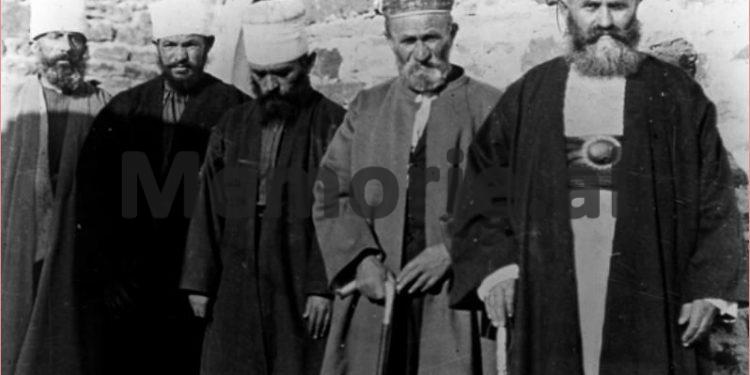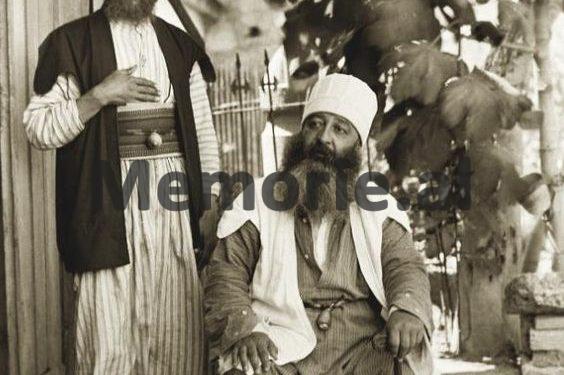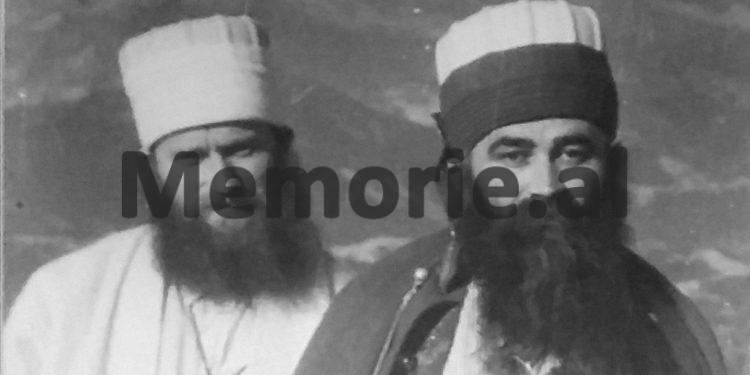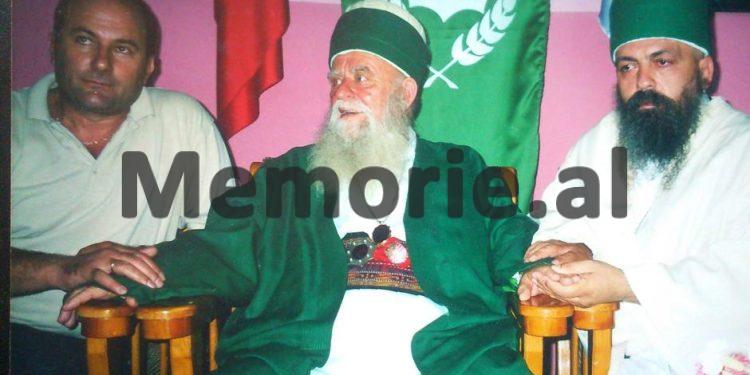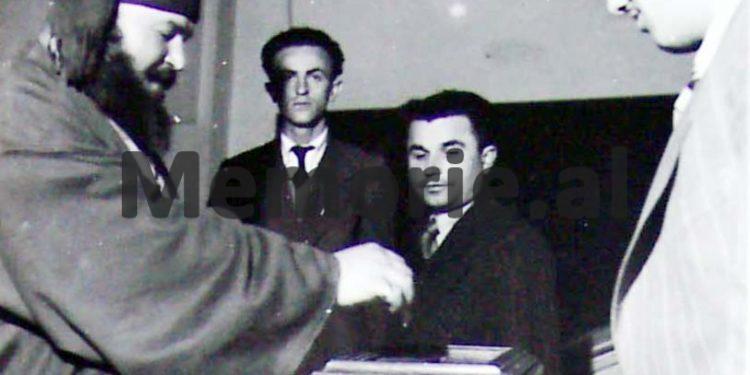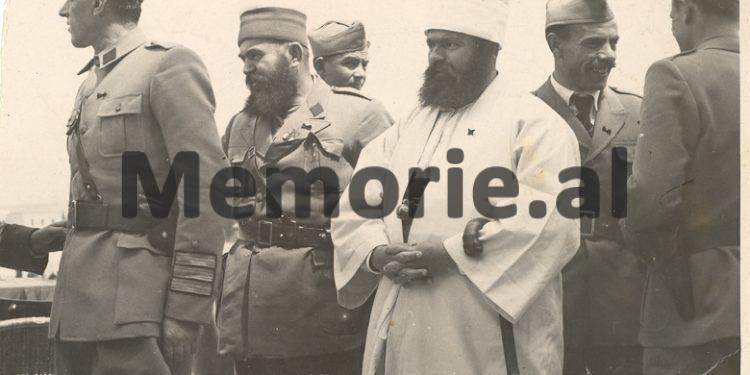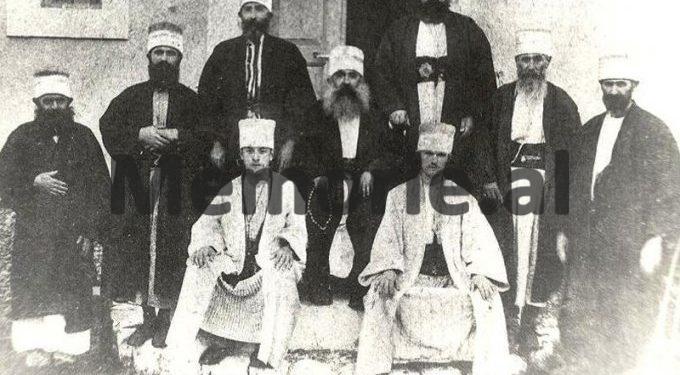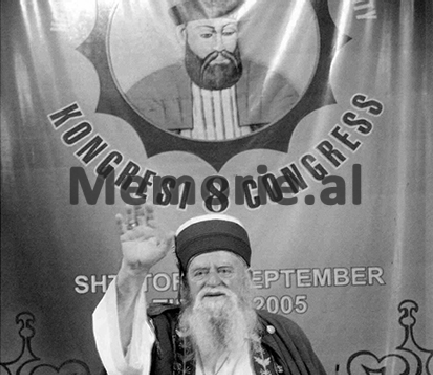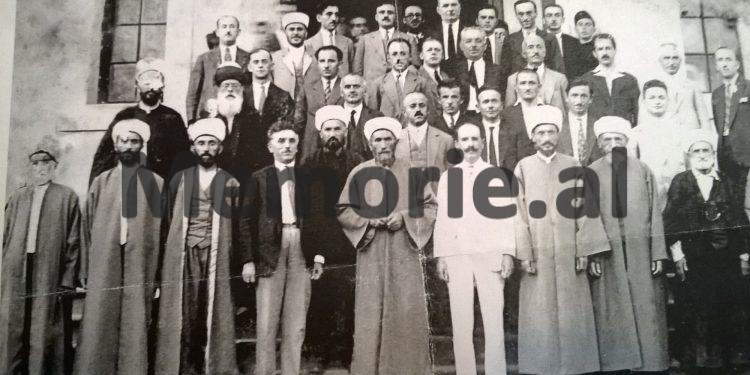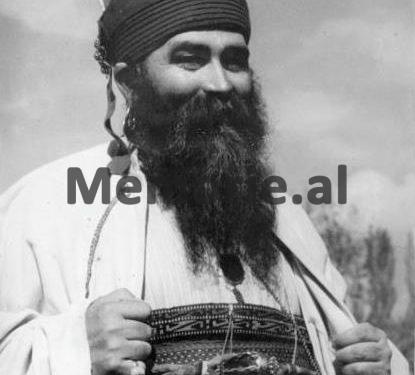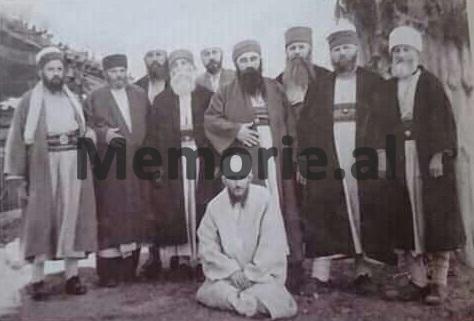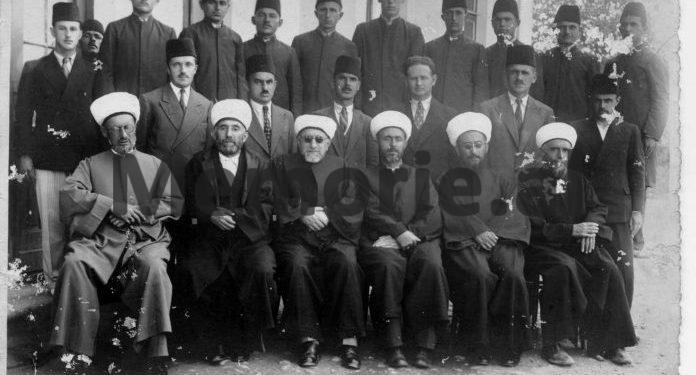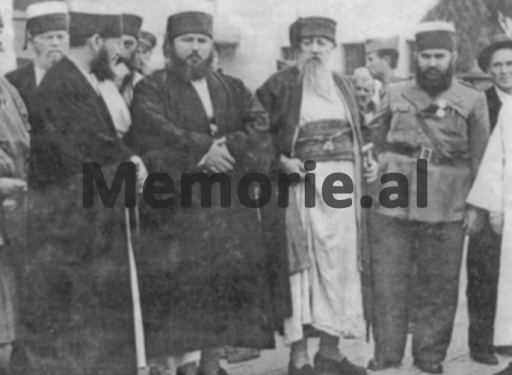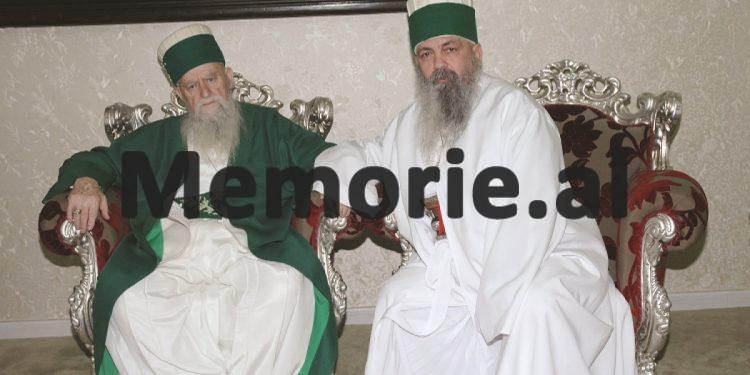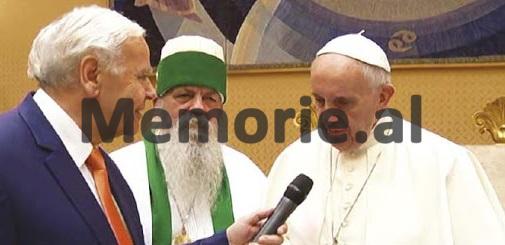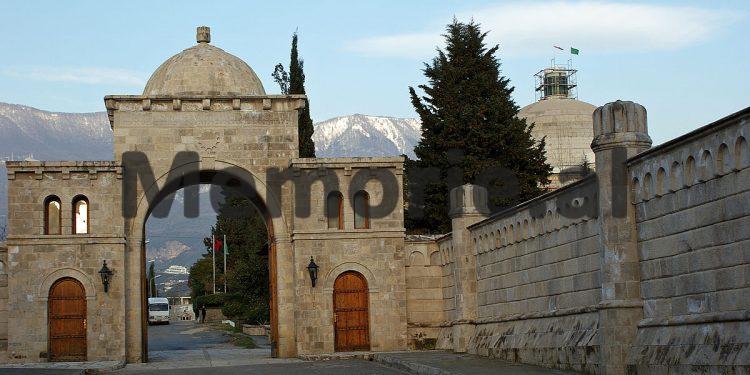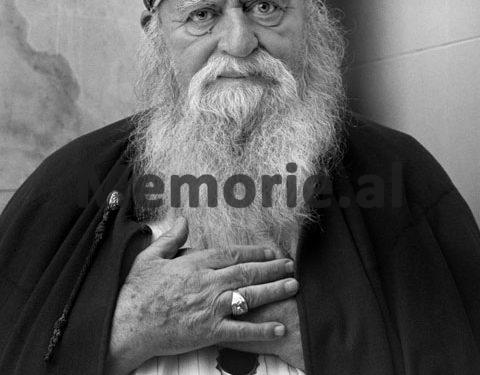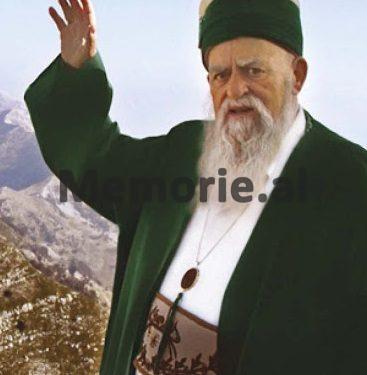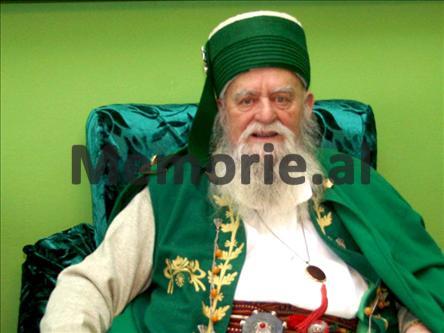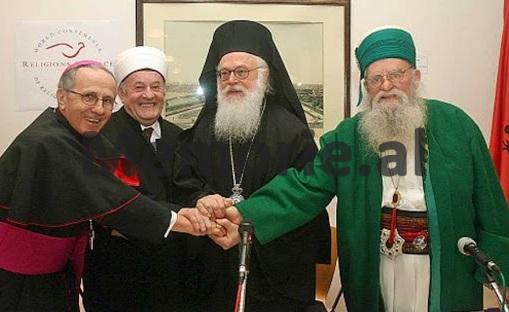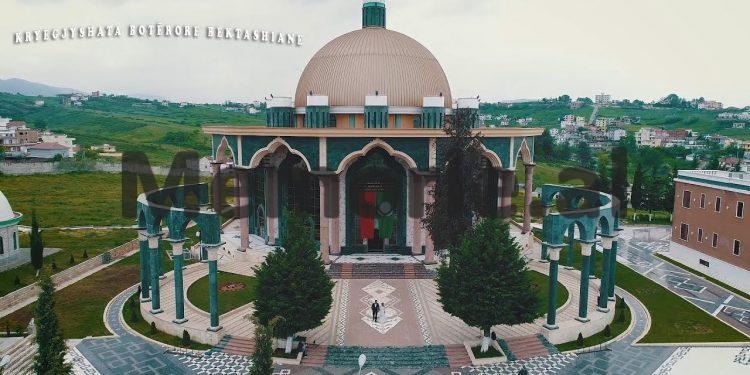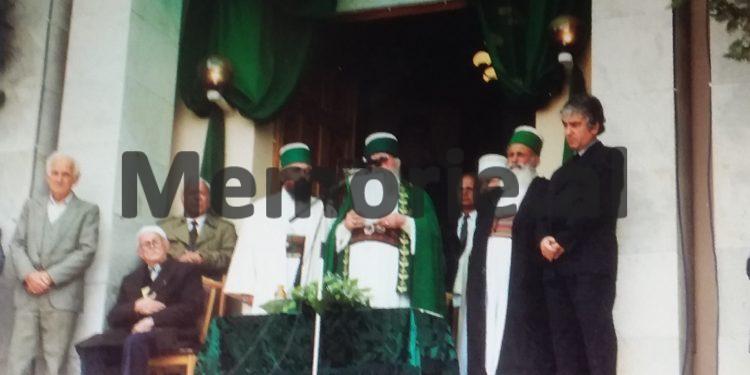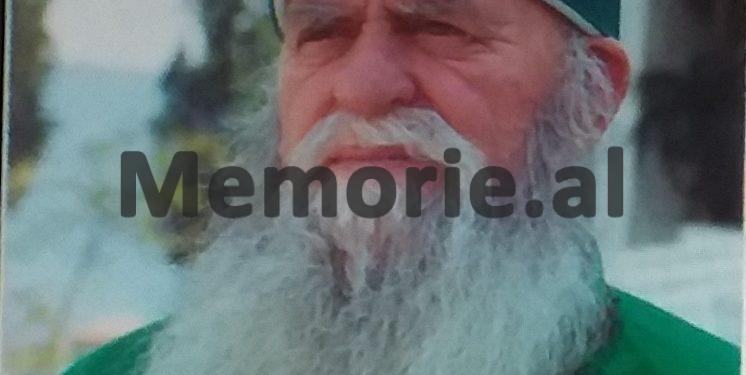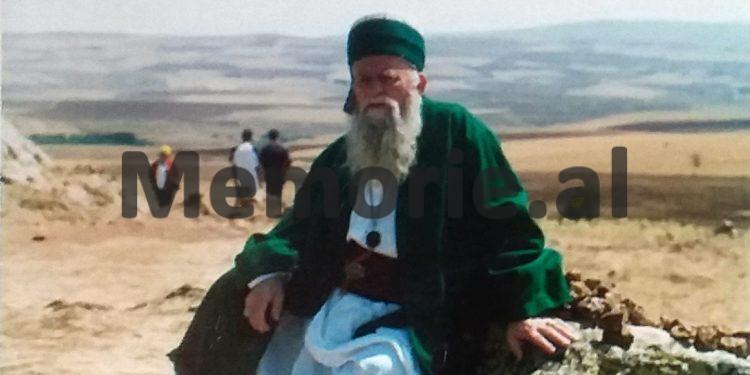Dashnor Kaloçi
Memorie.al publishes the unknown story of Baba Reshat Bardhi, the former World Leader of the Bektashis, originally from the village of Lusen in the Tea Mountains of Kukes, whose house was burnt down in September 1944 by partisan forces, with all its members inside and the youngest of eight children, could barely get out with the help of his parents after being engulfed in flames.
The Bardhi family moved from their hometown after Reshat’s father told them that another bigger mess was expected to fall on their family if they were to stay there and come to Tirana after a few days and nights long journey through mountains, until they settled in a ground floor house very close to the Bektashi World Headquarters on the outskirts of Tirana, where Reshati while guarding some sheep around her, looked in amazement at people with beards and long dresses up to the bottom of their legs coming in and out.
Baba Reshat Bardhi’s rare testimony about his past since he was handed over to Dervish at that Headquarters where Baba Ahmet Brahimaj served, originally from the village of Brataj in Vlora, who from State Security threats in 1958 moved from there and settled in the Drizari Tekke in Mallakastër, where he agreed to take with him Dervish Rexhepi, who would then, by a special decree, hand over the sacred duty, appointing him in his place as World Leader of the Bektashis. A task which he fulfilled faithfully until the end when he would close his eyes, after living a troubled life under the threats of the State Security and hard work in the Enterprise “Gjergj Dimitrov” in Tirana where he worked in hardship for more than 20 years.
Full 17 years ago, after an invitation made by the Deputy World Leader of the Bektashis, Baba Edmond Brahimaj and the General Secretary of the Presidency, Kujtim Ahmataj, we took the road to the outskirts of the capital, where on a beautiful hill at the foot of the former Enterprise Typographic of the Army, which most of the year is under the greenery, is the large building of the Headquarters, which is also the center of Bektashis around the world. In one of the rooms on the second floor of that beautiful building, completed in 1941, we were welcomed and welcomed by the World Leader himself, Haxhi Dede Reshat Bardhi, the gentle man who radiated only kindness, who that day, there was also a special day of life, as he celebrated his birthday. After much prayer he agreed to tell us about the life he had spent in the midst of few joys and many sufferings and vicissitudes, being the first and last interview he spoke about his life. Who was Baba Reshat Bardhi, what is his past, how did he come to the high position of World Leader and how did he spend twenty years of his life as an employee of agricultural enterprises?
Burning of the house in Lusen by the partisans?
Baba Reshati was born in 1936 in the village of Lusen in Kukës, where his family comes from. Regarding this and his childhood in those difficult times, Baba Reshati, in his soft voice and speaking slowly told us: “From a very young age when I was not more than nine years old, I was forced to go out to graze those few cattle that our poor family had, as at that time we were eight children and I was the sixth of the brothers and sisters. In addition to the great poverty that had plagued our family at that time, it was an even greater evil that had befallen us all. It was the fratricidal war that had started between the Albanians and its fuse had been ignited by the Yugoslavs, through its emissaries that it had brought to Albania. In that whirlpool of that civil war that had started furiously after the autumn of 1943, our poor family was found there in the village of Lusen of Kukës Teas. Although I was not more than nine years old at the time, I still remember the rain that fell on our house in the fall of 1944. As I was tending cattle on the mountain, I noticed a large plume of smoke coming out of our home. I immediately left the cattle alone and headed lightning towards the house, from which even bigger flakes of smoke continued to come out. As I approached the house, I noticed that it was engulfed by large flames from which my brothers and sisters began to come out. Until then I had not seen the most horrible scene and immediately started crying to scare us. As some of my brothers and sisters came out into the yard and cried out loud, our mother, Hania, began to sit down, calling out the names of other children who had not yet been able to leave the house. When they came out too, our mother counted seven children in our backyard, she screamed loudly: “Rexhepi, Rexhepi”, and stepped into the flames that were increasing even more. Rexhepi was our little brother who at that time was not more than two-three years old and his mother came in to take him out. After a few minutes she left the house with Rexhepi by her side and the flames of the fire had engulfed her, spreading throughout her body. After much effort, we were able to extinguish the flames that had engulfed her mother’s body with her little brother at her side. While we were all rescued, our tower burned down, and that fall afternoon as we were fleeing to take refuge with one of our cousins, on the way I learned that our house had been intentionally burned down. And before setting it on fire, they went inside checking and turning everything upside down. It all came as a result of the fratricidal war that had started in Albania at that time and the Yugoslavs had given it the impetus. As we all gathered at our cousin’s house, the older brothers told their mother not to get upset, as they would take revenge on those who had set our house on fire. But our mother, Hania, who was a noble woman who radiated only kindness, addressed her saying: ‘No my sons, it is not worth it for Albanians to take revenge on each other “, recalled 68-year-old Baba Reshat Bardhi, him distant and frightening story that took place in 1944, which would have almost turned into a real tragedy for their poor family. Although he has no desire to mention the perpetrators of that event, it is not difficult to understand that the partisan brigades did that to them, as their house was known as the support base of the nationalist forces.
From Kukes to Tirana
How did the fate of Reshat Bardhi’s family go after the burning of his house by partisan forces? In this regard, he recalled: “After our house was burnt down, my father told us that we would flee from there, because other mines were expected for our family, maybe even bigger than the burning of the house. Not only the father, but we children did not like leaving our house either, but our father told us that we had no other choice. from our village where we had left our childhood memories, it was not very easy and from there we left with tears in our eyes, but our parents calmed us down by telling us that there in Tirana we would be better and we would go through While he was determined to leave Lucien, my father sold the cattle along with some of the land we had, and after arranging those few loot on some of the horses given to us by our relatives, we set off on a long journey. After a few days we arrived in Tirana and settled in a ground floor house somewhere n on the outskirts of the city, at the foot of a hill where the Bektashi World Headquarters was located “, Baba Reshati recalled, moving his family from that remote village of Kukës and settling in Tirana, near the place where that cult building was, with which he will to then bind his whole life. Those distant years when his family settled in the capital, Baba Reshati remembered very well and he showed that in addition to preserving baggage, at that time he needed to continue school. He also remembered very well those years that he called “years of poison”, because “Albanians were killing and being killed by Albanians”. He had in mind the trials of that time and the crowds shouting “Traitors on the rope.” Baba Reshati used to tell us that he remembers as now that time when he was not more than 11 years old and in one of the streets where he was passing, large crowds of people who were listening to a trial with artisans, burst into applause when the verdict was given with death for those who were being tried there. In this regard he adds: “I do not know because in those moments I felt like a void and I remembered our burnt house in Lusen. That time was a cursed time, like a curse of blood,” he recalled the first years of after the war when he moved with his family to Tirana.
In 1954, Dervish in the Supreme Court
As little 11-year-old Reshati guarded his family’s cattle in the hills around the Bektashi World Headquarters, he watched in amazement as different people kept coming and going from that building that he still did not fully understand what it was. Regarding this and his later entry as a Dervish in the Bektashi World Headquarters, Baba Reshati recalled: “In 1948, Dede Ahmeti from the village of Brataj in Vlora came to head the Headquarters. He was a man well known for his wisdom and especially for his suggestive force he had.At the time he came to Tirana, he gathered around him many new believers, trying to awaken in them not only Bektashism, but also the deep feelings of understanding and love among Albanians. “Among those young boys who had lined up to” take over “Dede Ahmeti, I was too,” Baba Reshati nostalgically recalled of Dede Ahmeti, the good man of miracles who introduced him to the divine world of Bektashism. In this regard, he added: “Dede Ahmeti often took me and we both went to the grave where the remains of Naim Frashëri were buried, here in the courtyard of the Supreme Court. He spoke to me at length about Naim and knew by heart whole parts of his poems and especially of “Karbala” which he recited to me from time to time. When he finished reciting, he caressed a white stone and wished me: “Good luck and work for the homeland, as the martyrs of Karbala did”, Baba Reshati recalled, the words of Dede Ahmeti and his weakness for Naim Frashëri. Seven years later, in August 1954, Reshat Bardhi dressed as a Dervish near the Grandmother and was blessed by Dede Ahmeti. He remembered that day as one of the most memorable days of his life and expressed that he was very excited because he was carrying a heavy burden on his shoulders. Regarding this, he said: “Bektashism as a current and as a sermon, has very good wills, but these wills are realized through great hardships. Two days later, while Dede Ahmeti saw me very thoughtful, he said to me: ‘Even I when I surrendered to Dervish, that is how I thought “, he recalled the words of Dede Ahmeti, who would later become one of his idols.
Appointment as the Bektashi Chief
How did the life of the young Dervish, Reshat Bardhi, go after that and what was his career in the Bektashi flock: “In this regard, he recalled:” In 1958, Dede Ahmeti was called twice by the State Security and they were great pressures? After that he was told that he had to go to the Drizari Tekke in Wild Mallakastra. According to the words I heard in Kryegjyshata, Dede Ahmeti was told that, wherever he was going, he was forbidden to meet people and had to move from the tekke, only by order of the Internal Branch of Fier. As soon as I heard these words I immediately went to his room and after kissing his hands, I looked him straight in the eye. He was very sad. I immediately asked him to go with me to Drizar. After some thought, he looked me straight in the eye and said: ‘Yes, you will come with me to Drizar’. After that we both went to the village of Drizar, where his tekke was located on top of a mountain. Within a short time, the environment around that tekke turned into a garden with dozens of tree roots, because the fathers and dervishes who were there, at the instigation of Dede Ahmeti, worked with great dedication. After that, the Drizari Tekke compared to the poor houses of that village, seemed like a blessed thing and hundreds of believers started coming there from Kukes, Bulqiza, Kruja, Burreli, Vlora, Kolonja, Delvina and other districts of the country. But all that work we had started with so much devotion, was not said to go on long. Because around 1967, the ban on religion and the demolition of places of worship began. On June 30, 1967, Dede Ahmeti wrote the Holy Decree with his own hand and illegally informed me of it. By that decree he knew me as his deputy, and on that occasion, he told all the Bektashi believers, whether the Party wanted it or not, whether communism wanted it or not, this belief would remain as long as it remained and remained. with breath also the last Bektashi. And God willing, those words of his were confirmed “, Baba Reshati recalled regarding his appointment to the highest position of the Bektashis, showing us the original text of that decree, which reads:
“I order all the Bektashi clerics and believers, not only of Albania, but also of our entire globe, to know Haxhi Dede Reshat Bardhi, in my country, because this is the brightest mirror that will lead with dignity. The learned will honor him with their wisdom, the brave will protect him with their bravery, the generous will protect him with their generosity. All believers, without exception, bow down and receive light from Him, just as the stars receive light from the sun. ”
Ahmet Dede, Vlora 30 June 1967
Worker on the farm “Gjergj Dimitrov”
After 1967 when the communist regime of Enver Hoxha banned the freedom to practice religious beliefs and forcibly closed tekkes, churches, mosques, monasteries and other places of worship, Baba Reshat Bardhi was sent to work as a worker in the Agricultural Enterprise “Gjergj Dimitrov “in Tirana, where he was given shovels and pruning shears. In this regard, he recalled: “For about 20 years I worked in the heaviest physical work, almost crippling and refused to cooperate with the State Security, categorically rejecting twice the” offers “they made me. In those very difficult times, some of my close friends helped me to keep my faith in God alive.Usually I worked long hours or chord as it was said then, and at night, in the rain and snow, riding in cars, I would go and meet Dede “He took care of Ahmeti. He warmed my soul. And again, I left him because I was forced to return to work on Monday. But I did not get weak, because suffering makes a man more noble,” Baba Reshati recalled his years. work at the “Gjergj Dimitrov” Farm and the suffering for which he did not want to last any longer. After 1990, when the communist regime was forced to allow freedom of religion and the opening of places of worship, Baba Reshati returned to the Supreme Court, which had been turned into a nursing home. Although with a frail health from many years of hard physical work, with his devotion and dedication, the World Leader, Haxhi Dede, Baba Reshat Bardhi, managed to turn that cult object just like in its best days. With the same dedication he continued to work serving the many believers who frequented every day that blessed place in the north-east of Tirana, which continues to radiate only the kindness and generous hospitality of that sect which, among other things, is known as a symbol. of true Albanianism./Memorie.al




